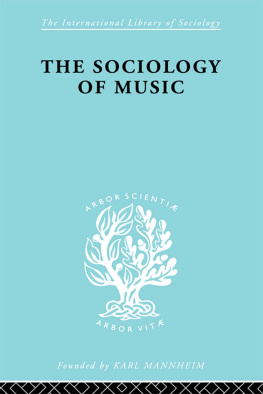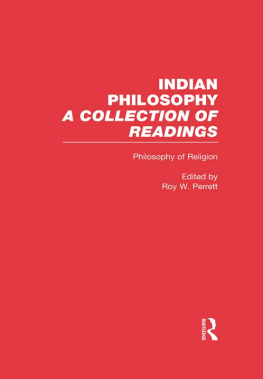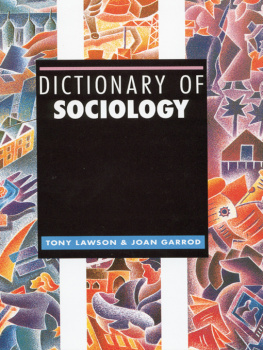The International Library of Sociology
THE SOCIOLOGY OF RELIGION
Founded by KARL MANNHEIM
The International Library of Sociology
THE SOCIOLOGY OF RELIGION
In 8 Volumes
| I | The Economic Order and Religion
(The above title is not available through Routledge in North
America) | Knight and Merriam |
| II | Islam and the Integration of Society | Watt |
| III | Religious Behaviour | Argyle |
| IV | The Sociology of Religion (Part 1): Established Religion | Stark |
| V | The Sociology of Religion (Part 2): Sectarian Religion | Stark |
| VI | The Sociology of Religion (Part 3): The Universal Church | Stark |
| VII | The Sociology of Religion (Part 4): Types of Religious Man | Stark |
| VIII | The Sociology of Religion (Part 5): Types of Religious Culture | Stark |
THE SOCIOLOGY OF RELIGION
A Study of Christendom
Part Three
The Universal Church
by
WERNER STARK
First published in 1967
by Routledge
Reprinted in 1998, 2000, 2002
by Routledge
2 Park Square, Milton Park, Abingdon, Oxon, OX14 4RN
or
270 Madison Avenue, New York, NY 10016
First issued in paperback 2010
Routledge is an imprint of the Taylor & Francis Group
1967 Routledge
All rights reserved. No part of this book may be reprinted or reproduced or utilized in any form or by any electronic, mechanical, or other means, now known or hereafter invented, including photocopying and recording, or in any information storage or retrieval system, without permission in writing from the publishers.
The publishers have made every effort to contact authors/copyright holders of the works reprinted in The International Library of Sociology. This has not been possible in every case, however, and we would welcome correspondence from those individuals/companies we have been unable to trace.
British Library Cataloguing in Publication Data
A CIP catalogue record for this book is available from the British Library
Sociology of Religion: Part Three The Universal Church
ISBN 978-0-415-17591-3 (hbk)
ISBN 978-0-415-60561-8 (pbk)
The Sociology of Religion: 8 Volumes
ISBN 978-0-415-17823-5
The International Library of Sociology: 274 Volumes
ISBN 978-0-415-17838-9
Publishers Note
The publisher has gone to great lengths to ensure the quality of this reprint but points out that some imperfections in the original may be apparent
Preface
The publication of this third volume brings to a close my study of the macrosociology of religion which I have defined as the investigation of the outer relations of religious bodies, i.e. their relations to the inclusive society. It remains for me to deal with the microsociology of religion, the inner relations or structures which characterize these social formations. As things stand at present, I envisage two further volumes, one on Types of Religious Man, and the other on Types of Religious Society.
Looking back on what I have done so far, I consider that I should be judged by two tests: whether I have succeeded in clearly defining the three fundamental forms which I have distinguished, establishment, sect and universal church, especially, of course, the last-named which is absent from the dichotomous scheme of Troeltsch and Weber; and whether I have filled in my abstract definitional frames with sufficiently vivid and varied concrete detail to make the concepts come alive. If I have failed, it is, I believe, in the latter respect rather than in the former; more than once I have felt frustrated by the limitations which are imposed on the scholar, even if he is prepared to work hard. A last-minute tally shows that I have consulted about 450 volumes to provide myself with factual material, and perhaps this is not too narrow a foundation on which to build a sociology of religion quoad exteriora.
I continue to be grateful to all those whom I have mentioned in my first volume, above all Dr. Madeline H. Engel, whose help has never faltered and whose patience has been beyond praise; also Fathers Quain and McNamara, and, of course, my wife. Miss Mary Kraetzer, M.A., has helped with the proofs. A small grant from Fordham University has enabled me to hire assistance for the onerous task of studying Philip IVs voluminous correspondence with Sor Maria de Agreda (cf. p. 169).
I am almost sorry to lay down my pen. I have enjoyed the work tremendously, and it is my dearest wish that something of this enjoyment may be accessible to my readers also.
W. STARK
Acknowledgments
As in volumes I and II, we list here, with thanks, the publishers who have been good enough to permit us to quote from books under their imprint. The authors names are given in brackets.
Edward Arnold (Publishers) Ltd. (Forster, E. M.); Ernest Benn Limited (Holmes, E.); The Bodley Head Ltd. (Hanke, L.); Burns & Oates Ltd. (Lindsay, T. F.); Cambridge University Press (Bennett, R. F., Parry, J. H.); Chatto & Windus Ltd. (Jones, H. M.); Collins Publishers (Ritter, G.); Columbia University Press (Haller, W., Tannenbaum, F.); Concordia Publishing House (Mayer, F. E.); The Dolphin Book Co. Ltd. (Parker, A. A.); E. P. Dutton & Co. Inc. (Queffelec, H., Scudder, V. D.); Little, Brown and Company (Vaughan, A. T.); Harvard University Press (Conybeare, F. C.); Alfred A. Knopf Inc. (Forster, E. M., Freyre, G., Tannenbaum, F.); David Mackay Company, Inc. (Jorgensen, J.); The Macmillan Company (Lindsay, T. F.); William Morrow and Company, Inc. (Aron, R.); Oxford University Press (Bridenbaugh, C., Hamilton, B., MacCrone, I. D.); Princeton University Press (Kantorowicz, E. H.); Sheed & Ward Inc. (Walsh, W. T.); University of Chicago Press (Benitez, F., Frankfort, H.); University of Pennsylvania Press (Hanke, L.); Prof. D. M. Wolfe and Mr A. C. Wright.
Introduction
The two basic forms of religious life which we have so far considered in this work, establishment and sect, are both foreshadowed in the pages of the New Testament: religious establishment in St. Paul and more particularly in his Epistle to the Romans, religious sect in St. John and more particularly in The Apocalypse. But in the Gospels there are the outlines of still a third possible attitude, which could not have been vivid in Ernst Troeltschs mind when he formulated his simple dichotomy of church and sect and taught two generations of sociologists to think in terms of this supposedly all-embracing alternative.
St. Paul felt no antagonism to the empire which was the framework of his life and labours; indeed, there are traces of genuine loyalism. As one student of the Apostle has stated: Paul was a Roman citizen, conscious of being a lord of the world in virtue thereof, even before he himself had set eyes upon the imperial city It was no foreign city, but one which he could truly call his own, that the Apostle longed to see (Romans 1, 13) As we see in St. Pauls own case, socially he belonged [as a Roman citizen] to the highest status of provincial society. St. Paul speaks to governors and kings; the asiarchs of Ephesus, too, priests of the established emperor-worship and the leading men of that great city, are expressly said to have been his friends (Acts XIX, 31). Those who had violated his Roman rights were not a little afraid (Acts XVI, 3739; XXII, 2529), for these rights were strictly enforced and protected The Apostle was not unaware of his own advantages in culture and social position.15: Let every soul be subject to [the] higher powers. For there is no power but from God: and those that are, are ordained of God. Therefore, he that resisteth the power, resisteth the ordinance of God. And they that resist, purchase to themselves damnation. For princes are not a terror to the good work, but to the evil For he is Gods minister to thee, for good. But if thou do that which is evil, fear: for he beareth not the sword in vain. For he is Gods minister: an avenger to execute wrath upon him that doth evil. Wherefore be subject, of necessity: not only for wrath, but also for conscience sake. It is not surprising that this passage has been a favourite of Anglican, Orthodox and Lutheran preachers down through the centuries.








